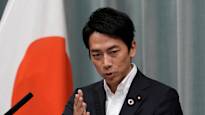Shinjiro Koizumi would be Japan’s youngest post-war leader. The vote between the main candidates is getting tight.
BEIJING Japan may soon have its first prime minister who has taken parental leave while serving as a minister.
Today, Friday, the ruling Liberal Democratic Party of Japan will vote for a new chairman, who will become the next prime minister. The decisive race is between three quite different candidates.
The 43-year-old representative of the new generation of politicians leads the opinion polls conducted for party members Shinjiro Koizumi. His father Junichiro Koizumi was the Prime Minister of Japan from 2001 to 2006.
Shinjiro Koizumi is Japan’s former environment minister. He was elected to parliament for the first time at the age of 28.
Koizumi would be Japan’s youngest post-war leader.
Koizumi, who studied at Columbia University in the United States, has a portrait of his political role model, the former President of the United States, on the wall of his office John F. Kennedy picture. Kennedy, on the other hand, was the youngest person elected president in US history.
A change to the Surname Act is required
Shinjiro Koizumi is known as a liberal politician. In his economic policy, he emphasizes the green transition and the development of small and light entrepreneurship. For example, he would like to legalize various carpooling services.
Equality issues are important to Koizumi. Among other things, he promises to promote a law change that would allow married couples to keep their own surnames or choose a surname together. Currently, in Japan, a woman usually takes her husband’s last name after marriage.
While working as environment minister, Koizumi took three weeks of parental leave. No other leading male politician in Japan has done the same.
Koizumi has been featured in the media a lot during his career. His wife is a TV journalist.
Koizumi’s weakness is considered to be his limited experience in foreign policy. According to experts, it is unclear what his line would be.
Outgoing Prime Minister Fumio Kishida tightened Japan’s relations with the United States and neighboring South Korea. During the Kishida period, Japan also invested heavily in its own armed forces.
The victory can also be taken by the “Iron Lady of Japan”
It is also possible that Japan will have a female prime minister for the first time in its history.
Koizumi is challenged in the presidential election by Japan’s current minister responsible for economic security Says Takaichi.
63-year-old Takaichi is a nationalist conservative. He is said to admire the former British Prime Minister Margaret Thatcherwho was called the “Iron Lady”.
Takaichi is known as a supporter of right-wing strict economic policies.
His opponents warn that he could anger neighboring South Korea and China.
Among other things, Takaichi has said that he plans to visit the Yasukuni shrine as prime minister, where Japanese people who have died in wars, but also convicted as war criminals, are honored.
The third main candidate, Shigery Ishiba represents Japan’s traditional political elite. The 67-year-old Ishiba is running for chairman for the fifth time.
Among other things, Ishiba wants to even out the economic differences between the richer and poorer regions of Japan.
The corruption scandal was Kishida’s fate
There are nine candidates for prime minister in total.
A new prime minister will be chosen because the current prime minister, Kishida, who held the position for three years, announced in August that he would give up his position. He was embroiled in the corruption scandal that afflicted the LDP party.
At the end of last year, it was revealed that several politicians of the Liberal Party have engaged in fund-raising for which no evidence can be found in the party’s books.
The 67-year-old Kishida, who belongs to a well-known political family, is the 100th Prime Minister of Japan. Both his father and grandfather were representatives in the lower house of the Japanese parliament.
Sources: Japan Times, Reuters
